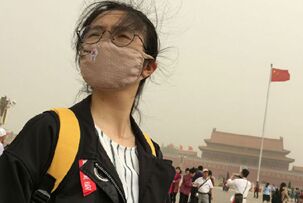中国空气中缺少灰尘反而使污染更严重?
|
Airborne dust is normally seen as an environmental problem, but the lack of it is making air pollution over China considerably worse. A new study suggests less dust means more solar radiation hits the land surface, which reduces wind speed. That lack of wind in turn leads to an accumulation of air pollution over heavily populated parts of China. The researchers found that reduced dust levels cause a 13% increase in human-made pollution in the region.
Hundreds of millions of people across China continue to be impacted by air pollution from factories and coal-fired power plants. Studies suggest that the dirty air contributes to 1.6 million deaths a year, about 17% of all mortalities. But this new research says that the human-induced pollution is being made worse or better by naturally occurring dust that blows in from the Gobi desert. Using models to simulate 150 years of wind and dust patterns in the region, the researchers found that the dust deflects significant amounts of sunlight. Differences in the temperatures between land and sea cause the winds to blow. Without the dust, the land warms up more and that changes the temperature differential with the sea leading to weaker breezes - and more air pollution. "There are two dust sources. One is the Gobi and the other is the highlands of north-west China, but we found the Gobi had much more influence," said lead author Yang Yang, from the Pacific Northwest National Laboratory in Washington State, US. "Less dust in the atmosphere causes more solar radiation to reach the surface. It weakens the temperature difference between the land and the sea and impacts the circulation of the winds and causes a stagnation over eastern China and that causes an accumulation of air pollution." |









